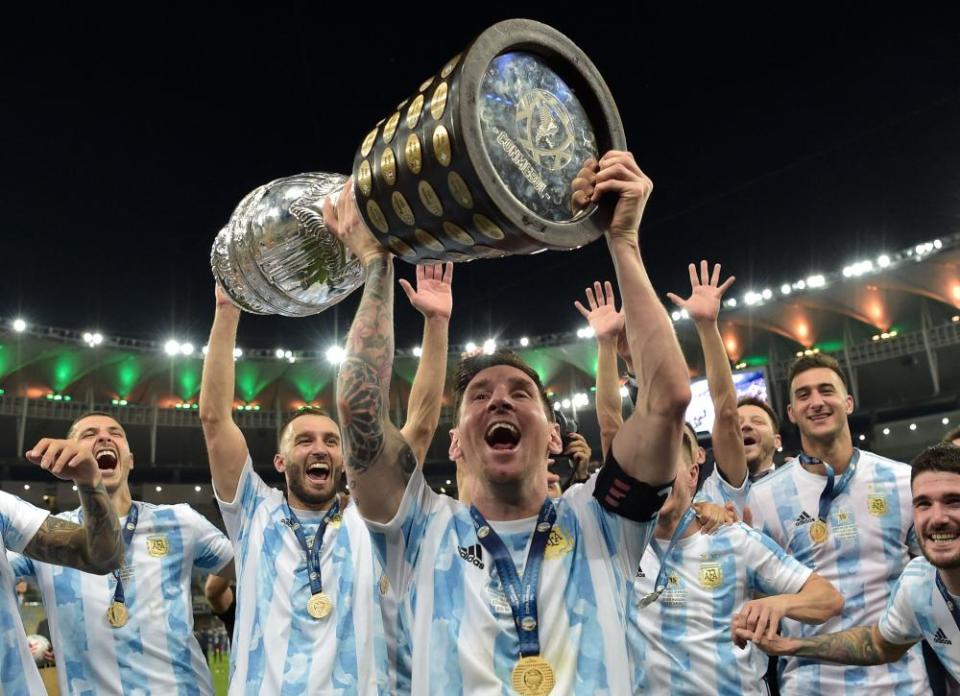Lionel Messi is well past his best but this seventh Ballon d’Or feels right

Prize was not earned in domestic competition or Champions League but in his spectacular Copa América domination
And so it was Lionel Messi again, for the seventh time and, barring the most extraordinary of all career finales at the World Cup in Qatar, surely the last. Whatever the idiosyncrasies of the Ballon d’Or, Messi’s excellence has been both absurdly consistent and absurdly resilient, and those seven titles since 2009 are some reflection of that.
To achieve that level of sustained success at any time would be spectacular; to do so in the age of Cristiano Ronaldo, who has won five Ballons d’Or since 2008, is extraordinary. Nobody else in history has won more than three – although there is a pleasing symmetry in the fact that when France Football reevaluated those years before the award was opened up to non-Europeans, Pelé also won seven in 13 years.
Related: Alexia Putellas and Lionel Messi named 2021 Ballon d’Or winners
And yet Messi’s success this year is probably the first that requires some unpacking. For a long time there’s been a sense that he was brilliant and Ronaldo was brilliant and while the more excitable sections of social media might get very worked up about it, so long as one of them got the award it felt about right. But watching Messi wander about at the Etihad last week, a memory of the player he had been, peripheral other than the moment when he helped create the Paris Saint-Germain goal, it was hard to conceive of him as the best player in the world.
PSG have a Ballon d’Or winner at last – but he has not won it for anything he has done in Paris, and there are multiple ironies in that. Neymar fled Barcelona to escape Messi’s shadow, to his own court where he could be king and yet, within five months of following him, the Argentinian has become the first player to win the Ballon d’Or at a French club since Jean-Pierre Papin in 1991. The club will probably see vindication, but Messi’s arrival, well past his best, was part of the same celebrity-driven model of football that has been so deleterious to its chances of European success.
Messi did not earn his Ballon d’Or in the Champions League, and he certainly didn’t earn it in Ligue Un or even La Liga (where Barcelona finished third), but in Brazil at the Copa América. And there is both an appropriateness and a romance to that – even if this was a pointless Copa added to the schedule to compensate federations facing a revenue shortfall because of the restructuring of the global calendar, a grotesque tournament played out in empty stadiums as Covid raged through Jair Bolsonaro’s Brazil, having been moved because of the impact of the pandemic on Argentina and civil unrest in Colombia.
In the end, for Argentina, it didn’t matter. They had not won a tournament since 1993. Generations of great players had gone without success at senior level. It looked as if Messi would as well, the doubts about how much he actually cared about playing for his country long since erased by a series of tearful exits from tournaments.

This Argentina squad is nowhere near as gifted as many of its forebears. Their manager, Lionel Scaloni, was appointed essentially because somebody had to after the mess of the Jorge Sampaoli reign, and he was cheap. But somehow the alchemy worked and Messi, dominating the tournament in a way no individual player has for at least a couple of decades, inspired a run that culminated in a 1-0 victory over Brazil in the final. It’s true there were only 7,800 there for the final, the only game not played behind closed doors, but still, there are few things more appealing to Argentinians than a heist at the Maracanã. “Everything I won was important and beautiful,” Messi said, “but this was the most difficult because I went through many things … it was knock after knock.” The victory, he added, gave him “peace of mind”.
Emotional as that moment was, though, the truth is that it’s been some time since Messi, for all his goals and obvious technical ability, those dashing feet, that thrillingly minimalist incisiveness, looked a player of the very highest level in Europe. Even before their financial meltdown, Barcelona had ceased to be a persistent danger in the Champions League, had developed a habit of going out with spectacular collapses. And one of the reasons for that was Messi and the demands that having somebody who does not or cannot press places on his own midfield.
Robert Lewandowski, for whom the new category of Striker of the Year seemed to be created as a consolation, probably would have won the title last year had it not been over-hastily cancelled because of the pandemic, but racking up goals as Bayern Munich win yet another Bundesliga seems a meagre argument.
Jorginho may point to his centrality both in Chelsea’s Champions League success and Italy’s victory in the Euros, and countless Manchester City players may wonder whether their contributions to the Premier League title might not have been recognised, but that’s the irony of modern football and the paradox of the Ballon d’Or: they were cogs within supreme teams, less immediately noticeable than the stars who dominate in less effective sides.
That’s why the Ballon d’Or often feels an anachronistic institution, servicing a celebrity culture that is incongruent with the best of modern football. And that’s why Messi was probably the right winner this year, because Argentina’s success in Brazil was a very old-fashioned victory.

 Yahoo Finance
Yahoo Finance 